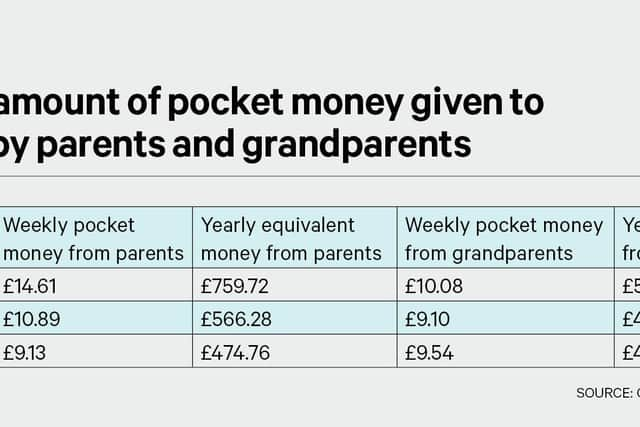Oldest children receive more pocket money than siblings


The study of families’ pocket money habits found that first-born children receive an average £760 a year from parents compared to £567 for second children – a 34 per cent difference in pocket money. Grandparents also pay more to first born grandchildren, giving them £524 a year, which is 11 per cent higher than the £473 for their second grandchild.
The nationwide study from Charter Savings Bank. reveals that on average, parents and grandparents across the UK collectively spend over £213 million every week giving pocket money to their children and grandchildren - the equivalent of £11.1 billion per year. This pocket money pay-out works out as £14.61 a week from parents for first-born children and just under £11 for second-born children.
Advertisement
Hide AdAdvertisement
Hide AdOn average, children start receiving pocket money from their grandparents at the age of four and their parents at the age of five, the research shows.


Paul Whitlock, executive director of Charter Savings Bank, said: “It’s interesting to see that being the oldest child is beneficial when it comes to pocket money, perhaps because parents have more disposable income with their first child than they do with subsequent children.
“Whether first, second or third child, the total amount of pocket money they receive over a year can be significant, so it’s understandable that parents and grandparents want to encourage children to set some of this aside and learn how to save.”
He added: “Pocket money is an incredibly useful way to educate children about the importance of both hard work and saving. If children must complete chores before they’re given pocket money, they’ll start learning a positive work ethic from a young age; and encouraging them to save up for something will help teach good financial habits. Ultimately, saving is one of the most important financial lessons to learn for adults and children alike.”
Three quarters of parents and two thirds of grandparents said they expect children to have done something to deserve their financial reward, teaching a valuable lesson about working and earning money from an early age.
Parents reward their children for completing chores at home on a regular basis, behaving well at school and behaving well at home, while a quarter use pocket money to ensure children do their homework.
The research also found that more than a third of parents and grandparents give advice to children about how to save up for what they want, while similar numbers insist their child puts some in a savings account or piggy bank. Almost a quarter find out what their child or grandchild is going to spend it on before handing the money over, while one in nine insist they spend it on something specific.